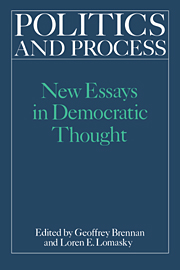Book contents
- Frontmatter
- Contents
- Acknowledgments
- List of contributors
- Introduction
- Chapter 1 The justification of democracy
- Chapter 2 Large numbers, small costs: the uneasy foundations of democratic rule
- Chapter 3 Evaluating the institutions of liberal democracy
- Chapter 4 Democracy: the public choice approach
- Chapter 5 The democratic order and public choice
- Chapter 6 Radical federalism: responsiveness, conflict, and efficiency
- Chapter 7 Contractarian presuppositions and democratic governance
- Chapter 8 In quest of the social contract
- Chapter 9 Rationality and the justification of democracy
- Chapter 10 The morality of democracy and the rule of law
- Index
Introduction
Published online by Cambridge University Press: 29 September 2009
- Frontmatter
- Contents
- Acknowledgments
- List of contributors
- Introduction
- Chapter 1 The justification of democracy
- Chapter 2 Large numbers, small costs: the uneasy foundations of democratic rule
- Chapter 3 Evaluating the institutions of liberal democracy
- Chapter 4 Democracy: the public choice approach
- Chapter 5 The democratic order and public choice
- Chapter 6 Radical federalism: responsiveness, conflict, and efficiency
- Chapter 7 Contractarian presuppositions and democratic governance
- Chapter 8 In quest of the social contract
- Chapter 9 Rationality and the justification of democracy
- Chapter 10 The morality of democracy and the rule of law
- Index
Summary
Democracy, it may seem, has never been less in need of defense — or even evaluation. Gradually, over the past couple of centuries, it has passed into the catalog of universal virtues. We are all democrats now, differing at most only in the qualifier we prefer: “liberal,” “workers',” or “people's.” Anyone labeled “antidemocratic” or even “undemocratic” has been ostracized from the relevant community of normative discourse. Correspondingly, any urgings in favor of democracy are likely to strike the contemporary ear as platitudinous.
Complacency, however, would be out of place. If “democracy” has become a “motherhood term,” it runs the risk of all such: that it become emptied of meaning. If all regimes, whatever their institutional detail and political spirit, claim to be democratic — as virtually all do — then what, we may reasonably ask, is undemocratic? Is it not a fair bet that charges made in the past against democracy — or for democracy against other regimes — have been answered by mere changes in the meanings of words? What are the defining features of a democratic order? What exactly are the virtues that democracy is supposed to engender? And does democracy really succeed? In some ways it is important that such questions be asked precisely when the answers seem to be so widely taken for granted.
- Type
- Chapter
- Information
- Politics and ProcessNew Essays in Democratic Thought, pp. 1 - 10Publisher: Cambridge University PressPrint publication year: 1989
- 3
- Cited by



